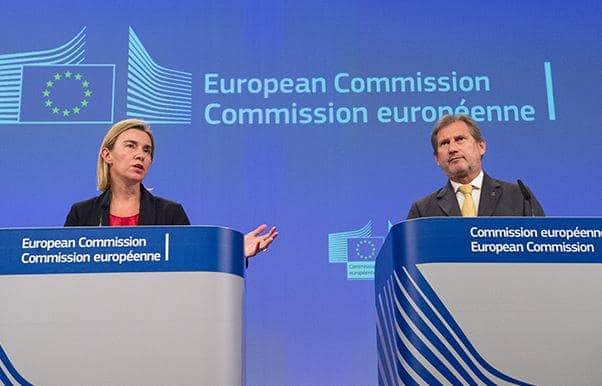In March 2015 the High Representative for Foreign Affairs and Security Policy, Federica Mogherini, and the Commissioner for European Neighbourhood Policy and Enlargement Negotiations, Johannes Hahn, launched a public consultation on the future of the European Neighbourhood Policy (ENP), which remained open until June 2015. ECAS submitted its contribution to this consultation, under which over 25o responses were received that been used to inform the review of the ENP, entitled ‘New Response to a Changing Neighbourhood: A review of European Neighbourhood Policy’ – jointly presented by Mogherini and Hahn on 18 November 2015.
ECAS’ input to this consultation was structured around three key axes :
- To empower Civil Society to enhance democratization processes in ENP countries;
- To include information and communication technology (ICT), Web 2.0 and new forms of democratic participation as focus areas in the ENP, and
- To support direct services to citizens and access to justice.
Below follows ECAS’ reaction to the recently released Communication on the ENP Review, based on the recommendations we submitted, which aimed at creating an enabling framework for CSO engagement in the region.
- ECAS welcomes the EU’s intention to further support “sub-national, national and intra-regional civil society […], both through direct means and through facilitating other organisations’ involvement.” ECAS is especially pleased that the EU is committed to support the capacity development of “Civil Society professionals and leadership in the neighbourhood using programmes such as Civil Society fellowship…” Both these commitments fall in line with ECAS’ recommendation that “one of the focuses of ENP programming should be to empower and support the development of Civil Society Organisations in all the concerned countries, providing adequate tools and funding mechanisms to enhance regional, but also North-South and East-West transfer of best practices amongst CSOs”;
- ECAS regrets that the Communication has not taken on board our recommendation to mainstream in the EU programmes support for ICTs and Web 2.0 and new forms of democratic participation. It simply mentions that “an open and free internet should also be promoted” and that e-Government should be strengthened – both rather weak statements on these key areas for further democratic development of the countries in the Southern Neighbourhood (SN);
- ECAS also encourages the instance on good governance, democracy, rule of law, human rights and the EU’s commitment to supporting the development of an “independent, transparent and impartial judicial system free from political influence which guarantees equal access to justice, […] and full application of the law’. We regret however that there is no explicit mention of free legal aid and support to organisations that are involved in providing first-hand legal advice and legal aid to the citizens of the SN, although it is possible that organisations involved in providing such services will be supported through the EU’s programmes in the region;
- As concerns migration, ECAS supports the EU’s intention to develop a “thematic framework to enable a more effective cooperation on migration with countries outside the neighbourhood”. A more integrated approach and an exchange of information and expertise in the countries of origin, along migration routes and destinations are essential in providing an adequate response to the migration crisis. The support to CSOs that are providing advice and legal aid to refugees in all these countries should be further strengthened. We also consider the EU’s continued engagement to promote mobility and people-to-people contacts “alongside efforts to tackle irregular migration” as a positive step. It reflects ECAS’ conviction that “through supporting exchange programmes and the transfer of best practices, the EU would underline the positive aspects of migration, balancing out the inevitable negative connotations linked to security concerns, immigration management and border controls”.
